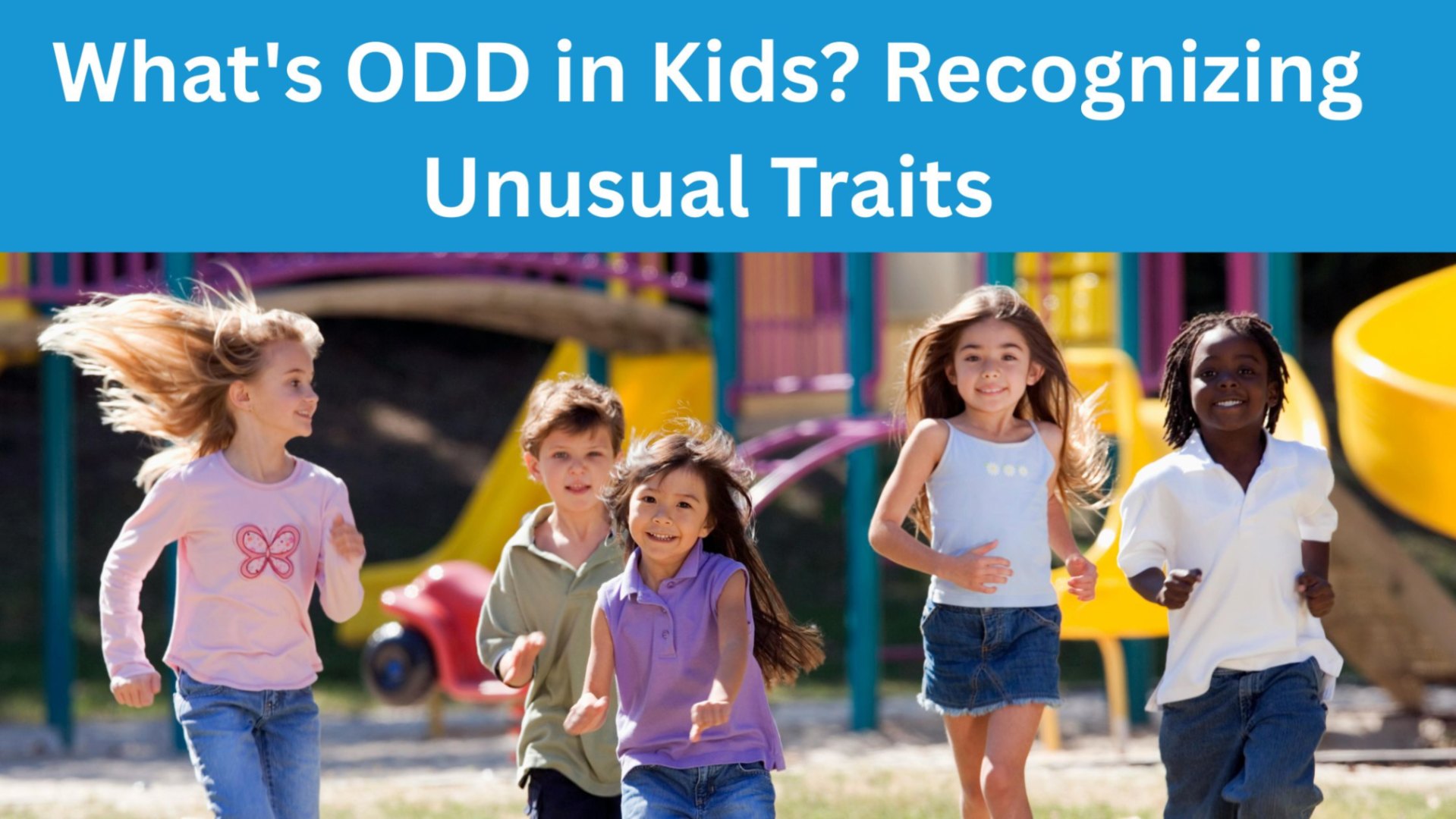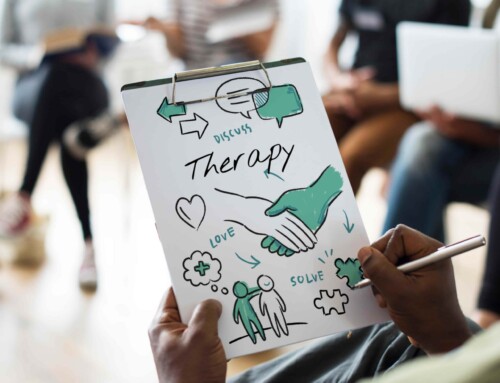What’s ODD in Kids? Recognizing Unusual Traits
TL;DR
|
|---|
Every parent knows that no two kids are the same. One child might chatter endlessly about dinosaurs, another arranges toys in perfect patterns, while a sibling seems lost in their own imaginative world.
These differences are part of what makes children unique, but sometimes a trait can feel unusual enough to make parents pause and wonder.
Study done by Children Mental Health Data and Statistics, show that nearly 1 in 5 children ages 3 to 17 (21%) have been diagnosed with a mental, emotional, or behavioral health condition. While not every unusual trait points to a diagnosis, it’s a reminder that paying attention to patterns can help parents catch potential concerns early.
At Total Life Counseling, we often meet families in this very stage of uncertainty. Our team helps parents understand whether their child’s quirks are simply part of growing up or whether they may benefit from professional support and guidance.
In this blog, we’ll explore the characteristics of ODD in kids, when to take them seriously, the treatment types and how parents can respond with confidence and compassion.
What Is ODD In Kids?
Oppositional Defiant Disorder (ODD) is a behavioral condition that typically begins in childhood. It falls under the category of disruptive behavior disorders and is marked by ongoing patterns of anger, irritability, and defiance toward authority figures such as parents, caregivers, or teachers.
Unlike ordinary disobedience, ODD is more structured and persistent. Children with ODD may:
- Frequently argue with adults or authority figures
- Lose their temper quickly and often
- Refuse to follow rules or deliberately challenge instructions
- Blame others for their mistakes or misbehavior
- Display spiteful or vindictive behavior problems on a recurring basis
These behaviors can strain family life, disrupt school performance, and make it harder for children to build healthy friendships. While children with ODD may not always feel distressed themselves, the impact is often deeply felt by those around them.
For parents and educators, recognizing ODD early is important. Timely support can prevent the behavior from escalating and help children develop healthier coping and communication skills.
For expert guidance and strategies to support your child, Book a session with our counsellor.
What Causes ODD In Children?
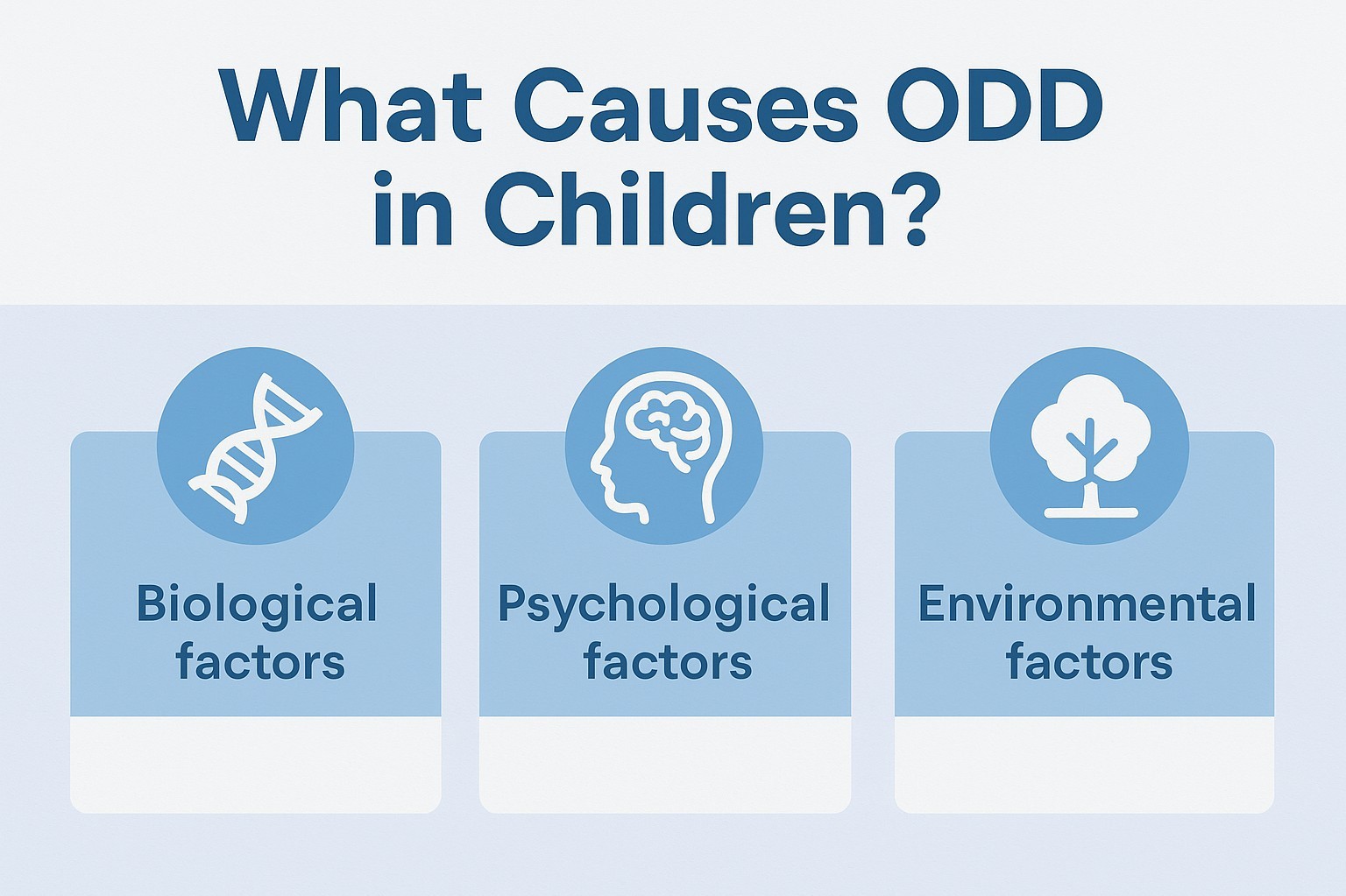
Oppositional Defiant Disorder (ODD) usually develops from a combination of influences. Experts often look at three main areas when understanding its causes:
1. Biological Factors
Some children are naturally more sensitive or impulsive because of the way their brains develop. Research shows that differences in brain chemistry and how certain neurotransmitters work can make it harder for them to control emotions or manage frustration. This doesn’t mean ODD is “hard-wired,” but it can make certain kids more vulnerable.
2. Psychological factors
ODD often doesn’t appear alone. Conditions like ADHD, anxiety, depression, or learning difficulties can overlap, making it harder for a child to cope with everyday stress. These challenges can intensify defiant or oppositional behaviors because the child feels misunderstood or overwhelmed.
3. Environmental factors
Family and social environments also play a big role. High levels of conflict at home, inconsistent or overly harsh discipline, or lack of positive reinforcement can reinforce oppositional behavior. Similarly, children who don’t feel secure or supported may use defiance as a way to gain control or express frustration.
Most often, ODD results from these influences working together, which is why both family support and professional intervention are important.
With the right support patience and progress are possible. The ODD masterclass helps parents and teachers find calm in the chaos.
What Are The Main Symptoms Of ODD In Kids?
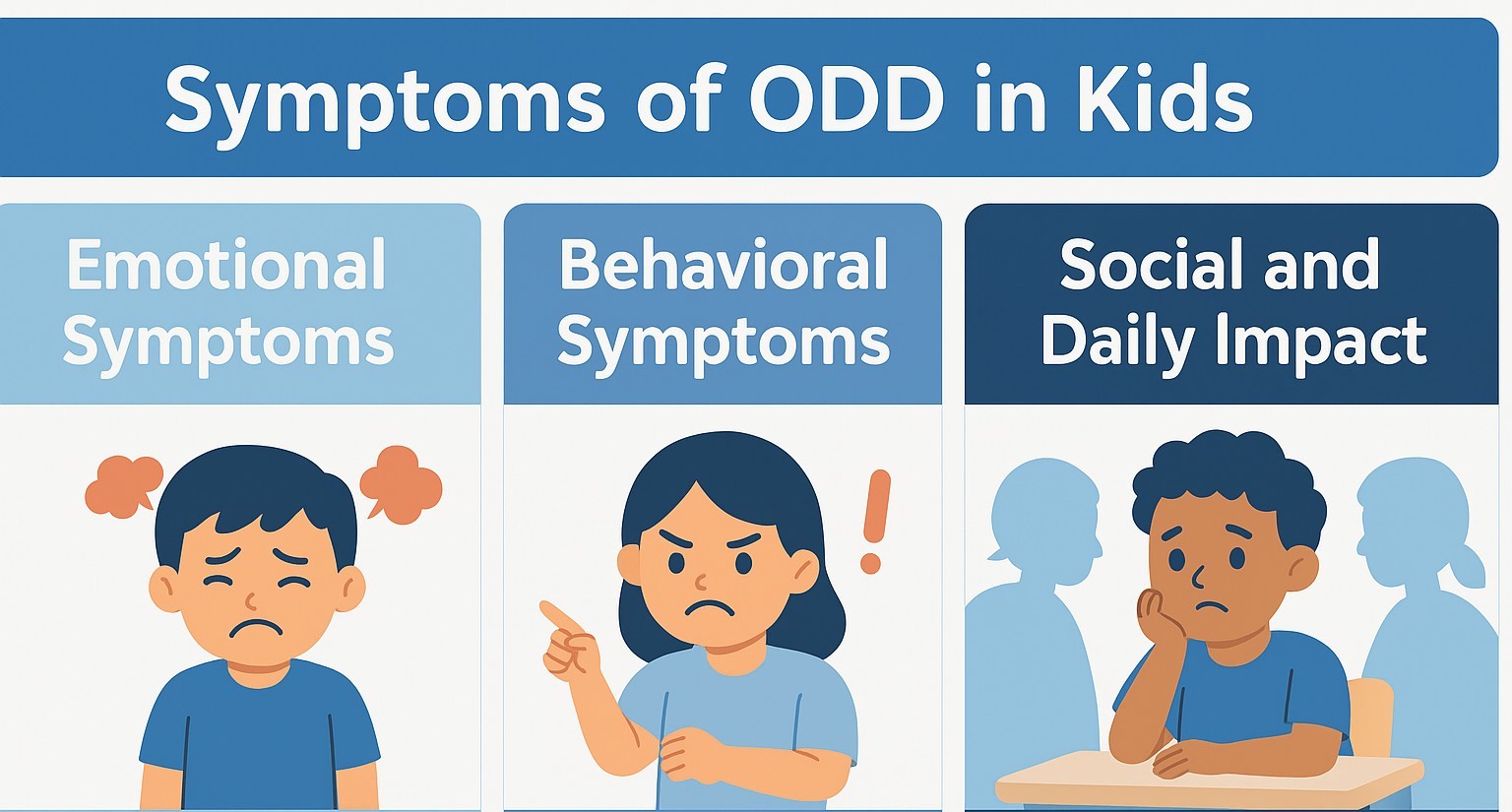
The symptoms of Oppositional Defiant Disorder (ODD) go beyond typical childhood defiance. They show up as frequent, long-lasting patterns of behavior that interfere with daily life at home, in school, and with friends. Here are some of the key symptoms parents often notice in children with ODD:
1. Emotional Symptoms
Children with ODD often struggle to manage emotions. They may:
- Lose their temper easily
- Become annoyed or irritated over small things
- Show frequent anger or resentment toward others
2. Behavioral Symptoms
The defiance linked to ODD shows up in actions, especially toward authority figures. Common behaviors include:
- Regularly arguing with parents, teachers, or caregivers
- Refusing to follow rules or instructions
- Deliberately annoying or provoking others
- Blaming others for their own mistakes or misbehavior
- Acting mean or hurtful toward others repeatedly
3. Social and Daily Impact
Over time, these symptoms affect more than just the child’s mood or behavior. They can:
- Disrupt classroom learning and routines
- Cause ongoing conflict at home
- Make it difficult to form and keep friendships
How Is Oppositional Defiant Disorder Diagnosed In Children?
Diagnosing Oppositional Defiant Disorder (ODD) isn’t based on a single test. Instead, it involves a careful evaluation by a qualified mental health professional such as a child psychologist, psychiatrist, or pediatrician.
What Professionals Look For?
During the evaluation, the clinician will:
- Talk with parents, teachers, and sometimes the child to gather observations
- Review the child’s behavior across different settings (home, school, social situations)
- Check how long the behaviors have been present (usually six months or more)
- Consider whether the behaviors are more frequent or intense than is typical for the child’s age
The Checklist for Diagnosis
According to the Diagnostic and Statistical Manual of Mental Disorders (DSM-5), a diagnosis of ODD requires a pattern of:
- Angry or irritable mood
- Argumentative or defiant behavior
- Vindictiveness
These symptoms must cause significant problems in daily life, such as at school, at home, or with peers.
What Are The Effective ODD Treatments For Kids?
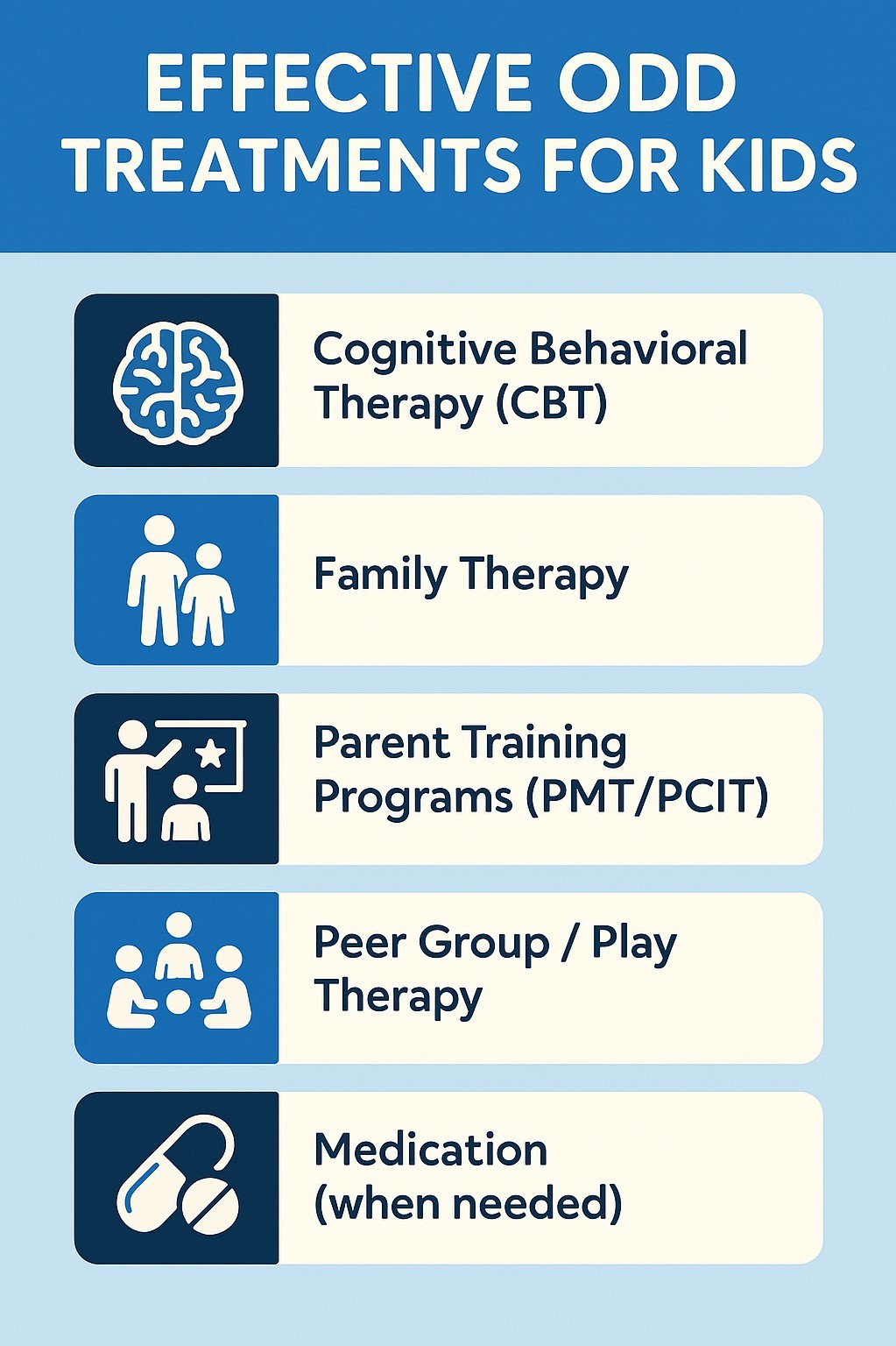
Managing Oppositional Defiant Disorder (ODD) usually involves a mix of therapies, and sometimes medication if other conditions are present. The goal is to help children manage emotions, reduce conflict at home and school, and improve relationships.
1. Cognitive Behavioral Therapy (CBT)
Cognitive Behavioral Therapy teaches children how their thoughts influence their feelings and actions. In therapy, they practice problem-solving, impulse control, and anger management. Over time, they learn healthier ways to respond when frustrated or challenged, instead of resorting to defiance.
Alongside therapy, activities that build self-confidence are powerful. Simple strategies like self-esteem activities for teens can help older children develop resilience, which complements ODD treatments.
That’s why having access to the right professional guidance makes all the difference. Many families turn to Total Life Counseling, where therapists blend CBT with practical tools for confidence and family harmony, while also offering support for ADHD, trauma, anxiety, marriage counseling, and more.
2. Family Therapy
ODD affects the whole household, not just the child. Family therapy helps parents, siblings, and the child communicate more effectively, resolve conflicts, and reduce stress at home. It also gives parents tools to support their child consistently while helping siblings understand and cope with the challenges.
3. Parent Training Programs (PMT/PCIT)
If you’re a parent or a caregiver asking, How to handle kids with odd? Well, the parent training programs equip you with practical strategies.
Through Parent Management Training (PMT) or Parent-Child Interaction Therapy (PCIT), caregivers learn how to set clear expectations, use positive reinforcement, and remain calm and consistent during conflicts. Parents are often coached in real time so they can apply new skills directly with their child.
4. Peer Group Therapy
For older children and teens, group therapy or play therapy provides a safe environment to build social skills. They practice cooperation, conflict resolution, and empathy with peers who may face similar struggles. This can boost confidence and reduce isolation.
5. Medication (when needed)
There is no medication specifically for ODD. However, if a child also has conditions like ADHD, anxiety, or depression, treating these can help reduce oppositional behaviors.
For example, ADHD medication may improve focus and reduce impulsivity. In rare cases of severe aggression, doctors may prescribe medication to stabilize behavior, but always as part of a broader treatment plan that includes therapy.
These approaches give parents practical tools for how to deal with kids with ODD, while helping children manage emotions more effectively.
How Can Parents & Teachers Support A Child With ODD?
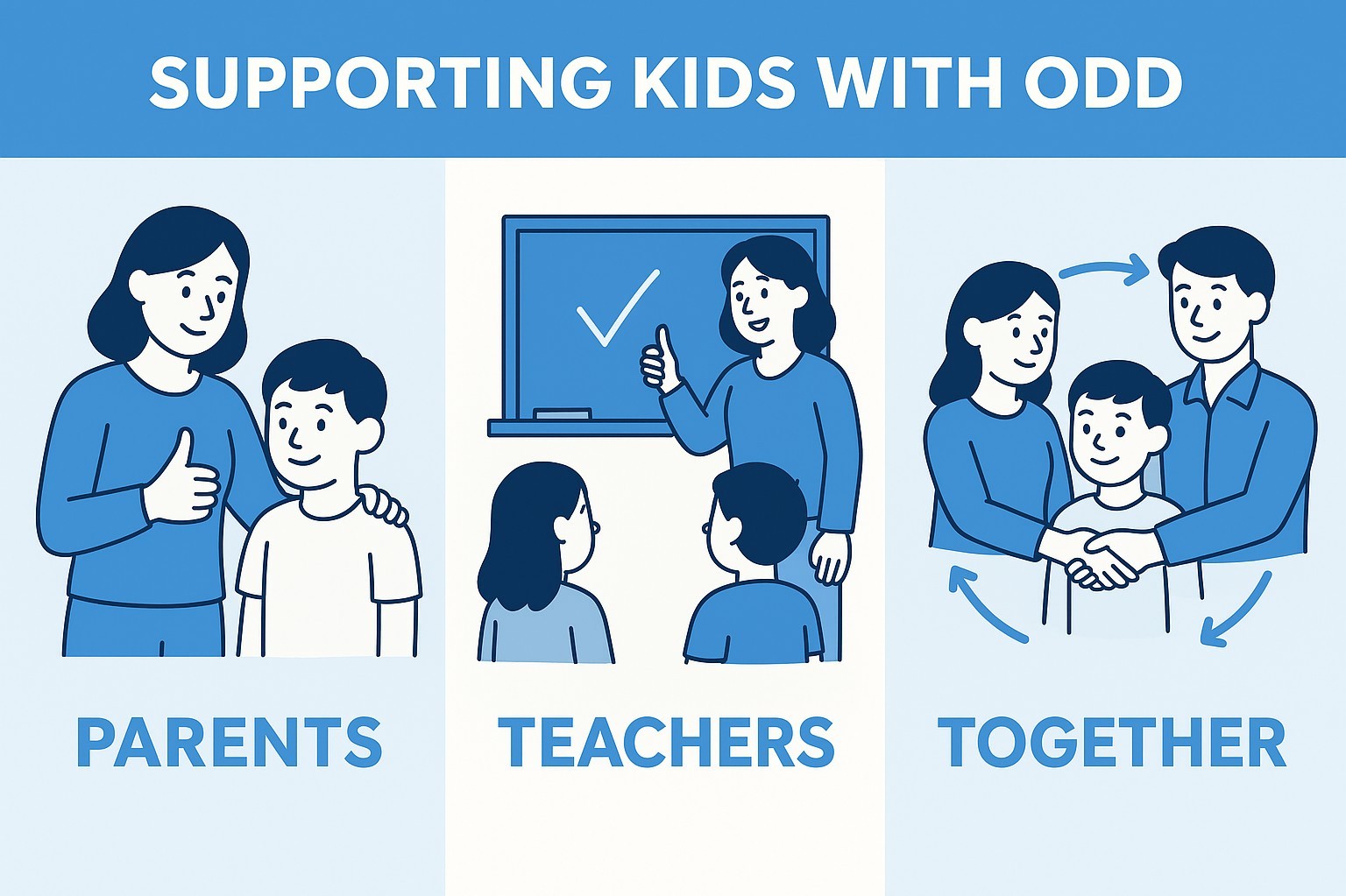
Children with Oppositional Defiant Disorder (ODD) benefit most when parents, teachers, and school staff work together. A consistent approach across environments reduces confusion, reinforces positive behavior, and helps the child feel supported rather than singled out.
How Can Parents Manage Challenging Behaviors Associated With ODD?
One of the biggest questions families ask is how they can manage ODD behaviours without constant conflict. It’s natural to feel overwhelmed, but the good news is that change is possible.
By using consistent routines and focusing on positive reinforcement instead of punishment, parents can guide behavior in a way that reduces tension at home.
Helpful approaches include:
- Praise positives: Notice cooperation and flexibility, even in small steps.
- Be consistent: Keep rules clear and consequences predictable.
- Model calm behavior: Show your child healthy ways to handle frustration.
- Use time-outs constructively: Take breaks when emotions escalate to prevent conflict from spiraling.
How Teachers Can Be Part Of The Solution?
School success is equally important, and it requires collaboration with educators. Teachers who understand a child’s diagnosis can use classroom strategies that match what parents are practicing at home.
Effective school supports may include:
- Shared behavior plans: Consistent reinforcement strategies across home and classroom.
- Regular communication: Check-ins between parents and teachers to monitor progress.
- Accommodations if needed: Adjustments under education guidelines to support learning and social development.
When home and school work hand in hand, children receive consistent messages and expectations. This teamwork reduces disruptive behaviors, encourages better social skills, and gives children with ODD the foundation they need to succeed both academically and personally.
Why Choose Total Life Counseling For Your Child’s Support?
If your child’s defiance, emotional struggles, or behavioral challenges are affecting daily life, getting professional support early can make all the difference. At Total Life Counseling, our team specializes in working with children, teens, and families facing ODD, ADHD, anxiety, depression, trauma, and more.
Our licensed therapists provide evidence-based care that focuses on lasting change:
- Cognitive Behavioral Therapy (CBT): Helps children manage anger, improve impulse control, and build problem-solving skills.
- Play Therapy: Creates a safe, child-centered way to express emotions and practice new behaviors.
- Family Training: Strengthens communication and reduces conflict in the home.
- Parent Training: Equips caregivers with strategies to handle defiance and encourage cooperation.
At Total Life Counseling, we believe in treating the whole family, not just the symptoms. Our approach is compassionate, practical, and focused on building resilience.
Reach Out Now to connect with a counselor.
Final Thoughts
Every child has their own way of seeing the world, and sometimes that means their behaviors stand out in ways that feel unusual. While it can be challenging, these traits do not define a child’s future. With patience, consistency, and the right support, young children can learn to channel their struggles into strengths.
For parents asking how to help kids with ODD, the answer lies in early intervention, steady support, and a compassionate approach.
Each step forward, no matter how small, is progress toward helping a child thrive at home, at school, and in life.
Frequently Asked Questions
Is ODD linked to anxiety, ADHD, or other mental health issues?
Yes, ODD frequently co-occurs with other mental health conditions. There are strong links between ODD and attention deficit hyperactivity disorder (ADHD), anxiety disorders, and mood disorders. A thorough evaluation is needed to identify all co-occurring issues. Often once the ADHD is treated a lot of the ODD symptoms improve.
What resources and support are available for American families dealing with ODD?
Families can find support through various intervention programs, including parent training and family therapy. A mental health provider can connect you with local resources, and school support staff can help implement strategies in the classroom. Support groups for parents can also be very helpful.
When should parents seek professional help for unusual behaviors?
You should seek help from a mental health professional like a child psychologist or child psychiatrist if your child’s behavior is persistent, severe, and negatively impacts their school life, family relationships, or social functioning. Your healthcare provider can provide a referral.
How to work with kids with ODD?
Stay calm, set consistent boundaries, and use positive reinforcement. Pair home strategies with professional support such as CBT or family counseling to encourage healthier behaviour.
Do kids grow out of ODD?
For some, symptoms lessen with maturity and support. For others, untreated ODD may continue into adolescence or adulthood, sometimes leading to more serious conduct or mood disorders. Early intervention greatly improves the chances of positive outcomes.
Are kids who have odd able to have friends?
Yes, kids with ODD can have friends, but their defiance and irritability may strain relationships. With support, social skill-building, and consistent guidance, they can form and maintain healthy friendships.
Filed in: Jim West, Odd in kids
Share This Story, Choose Your Platform!
Total Life Counseling Center consists of Licensed Counselors, masters level therapists, Español counselors, Licensed Mental Health Counselors, business coaches, and image enhancement coaches who provide counseling for emotional, mental, physical and spiritual care including marriage, individual, family, substance abuse and more. TLC’s family, trauma and marriage experts have been interviewed on National and Local TV/Radio over 200 times for their expert advice on Fox News, OWN, WETV, ABC’s Medical Minute and more. Our skilled counselors are relational, approachable and specialists providing therapy services in the Central Florida area including: Orlando, Winter Park, MetroWest, Windermere, Dr. Phillips, East Orlando, Lake Mary, and Clermont, Boca Raton Florida, and Dallas, TX.

